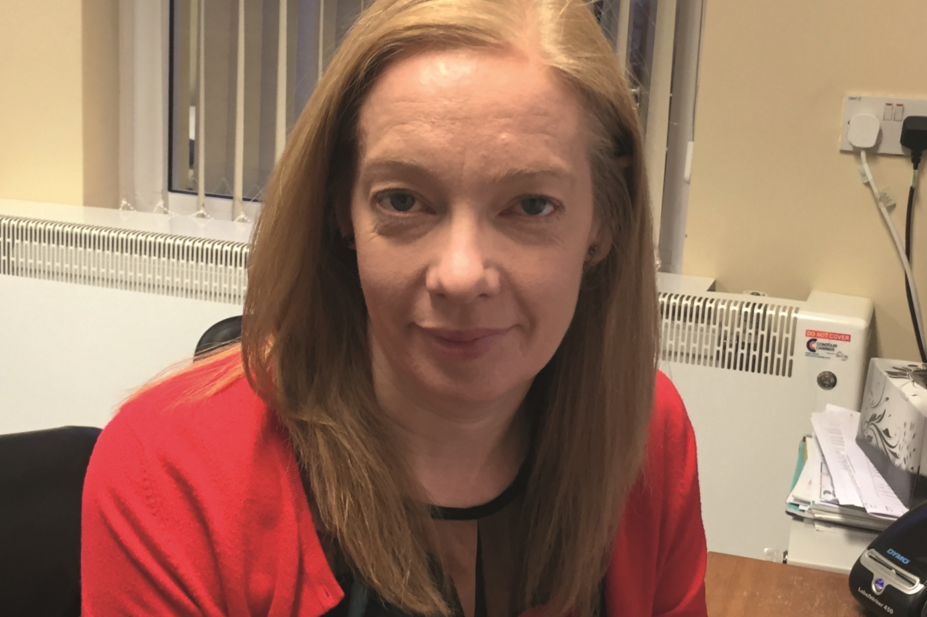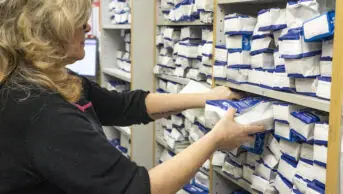
Courtesy, Nuala Hampson
Nuala Hampson is a general practice pharmacist at West Bridgford Medical Centre in Nottinghamshire, and education supervisor with the Centre for Pharmacy Postgraduate Education (CPPE) for the NHS England Clinical Pharmacists in General Practice programme.
How has your career path and development led you to your current role?
For the past six years, I have been employed part time in a small GP practice in Nottinghamshire. I undertake a range of tasks including medication and chronic disease reviews, handling medication-related queries and advising on prescribing-related areas such as monitoring of high-risk drugs.
After graduating from the University of Nottingham School of Pharmacy in 1994, I worked in both hospital and community pharmacy. I started working in primary care in 1999 in Sheffield for a number of primary care groups, and for primary care trusts (PCTs) in Leicestershire and Derbyshire as a practice-based pharmacist and prescribing adviser. In 2004, I gained a prescribing qualification and my designated medical prescriber asked me to work for his practice — my first practice-employed role.
Why did you decide to work in general practice?
My early work with primary care organisations gave me the opportunity to collaborate with multiple GP practices. My clinical knowledge and medicines management skills developed greatly during this time. I discovered that I really enjoyed the patient-facing aspect of general practice and that pharmacists’ medication expertise is unique and can be used very effectively to benefit the care of individual patients.
In my opinion, the role for pharmacists in general practice is appealing because you get to use your clinical skills to their full effect. The role of a pharmacist in general practice is broad and diverse, hence there is the potential to develop your skills in a range of ways. Some pharmacists have improved their clinical examination skills and oversee the acute care of common conditions. Others focus on chronic conditions and complex medication review. Being part of the general practice team and making a real difference to the lives of individual patients is very rewarding.
How does working in general practice differ from other pharmacy sectors?
Although I have worked in both hospital and community pharmacy, I did so when I first qualified, so my experience in those sectors is now quite out of date. However, I think the main difference from hospital is that you tend to see patients on a repeated basis, so you can build rapport and get to know them and their situation. The difference from community pharmacy is having dedicated time for pre-booked appointments, full access to medical records and the ability to discuss issues with GPs face to face as they arise.
What career progression opportunities are available for general practice pharmacists?
At present there is no set career progression in general practice. Different pharmacists in different practices carry out very different roles. The role is often defined by the interests and skills of the individual pharmacist and the needs of the practice in which they work. Hence, it is often down to the individual pharmacist and their practice to decide how to progress their career. This may change in the coming years with the development of the NHS England (NHSE) programme for clinical pharmacists in general practice.
What is the NHSE programme for clinical pharmacists in general practice?
NHSE has invested more than £100m in developing the role of pharmacists in general practice. The programme invites GP practices and other providers of general medical services to apply for funding to help recruit and develop more clinical pharmacists. It provides funding towards the employment costs of pharmacists on a reducing basis over three years. All pharmacists in the programme undertake a structured 18-month education programme with CPPE to develop skills relevant to general practice. Funding is also provided to complete the prescribing qualification at higher education institutions across England for pharmacists who are not yet qualified prescribers.
How does the NHSE programme benefit pharmacists and how can those interested get involved?
The NHSE programme has significantly raised the awareness of the role of pharmacists in general practice. More and more GPs are recognising the medication expertise which pharmacists bring to the team. Those involved in the programme benefit from a structured support system and protected study time to attend study days, workshops and small group learning sets. Pharmacists are encouraged to plan and review their development and learning, including maintaining a portfolio of evidence to prove competence.
What advice would you give to pharmacists wishing to pursue a career in general practice?
It is important to be familiar with how general practice works and how pharmacists can be used in general practice. Get to know your local GP practices, familiarise yourself with the various targets and standards that general practice works to (e.g. Quality Outcome Framework, enhanced services, Care Quality Commission targets). Understand the day-to-day working of general practice and consider what role you might play in relation to this. For a particular practice, consider the needs of the patient population and the skill mix of the staff to identify where you can have an impact, without duplicating the role of existing staff. I would recommend talking to pharmacists already working in general practice and reading up on information available on the role — the Primary Care Pharmacy Association website is a useful resource. If possible, do some shadowing or observation of pharmacists working in general practice.
To get involved, see the NHSE website for more information.
Find out if any of your local practices are applying to the programme and sign up to NHS Jobs and
The Pharmaceutical Journal Jobs board, where many of the pharmacist jobs are advertised.


